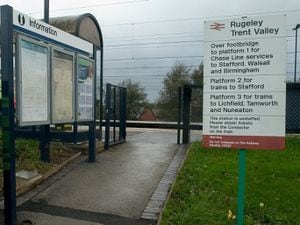Robot guides at train stations set to be trialled in West Midlands
Train usage has plummeted during the pandemic – but plans are already in place to help deal with overcrowding once the crowds return.

Robot guides at train stations and smart cameras to reduce overcrowding on trains and buses are set to be trialled in the West Midlands as part of a £1.6 million scheme.
The plans will see six projects launched to explore the benefits of 5G technology on the region's transport network.
It comes as official figures reveal just how dramatic an impact the coronavirus crisis has had on our railways.
Rail passenger journeys in Great Britain fell to the lowest levels of annual passenger usage since at least before 1872, when records started, according to official statistics from the Office of Rail and Road.
Nationally, 388 million journeys were made in 2020-21 (April to March), which equates to only 22 per cent of the 1,739 million made in 2019-20. Total passenger revenue in Great Britain was £1.9 billion in 2020-21, compared to £10.4 billion in 2019-20.
On Avanti West Coast the figure fell from 37.5m in 2019-20 to just 6.2m in 2020-21. Cross Country numbers fell from 39.8m to 6.7m and West Midlands Trains fell from 79.5m to 13.6m.
Passengers are starting to return to the trains, but home working and social distancing means levels are still down on normal. With the vaccine roll-out moving on, it is hoped social restrictions will be eased, allowing the return to full capacity.
Graham Richards, Director of Planning and Performance at the Office of Rail and Road, said: "This unprecedented fall in passenger numbers, the lowest annual fall since the time series began, has clearly had an impact on both rail usage and ticketing revenue.
“Despite this, recent estimates published by the Department for Transport show that rail usage has recovered to around 45 per cent of pre-Covid levels by the end of May 2021.
“ORR continues to work closely to support industry and help passengers back on to the railway safely.”
Figures released by the ORR showed passenger numbers increasing year-on-year before the pandemic hit.
In one project to deal with increasing numbers in the future, 5GER will develop the UK's first 5G-enabled smart train station robot for use at Birmingham New Street.
The robot will be able to autonomously navigate the station, interact with people, provide information and assurance to those in need of extra information or assistance to help improve passenger confidence in stations.
Another project will use 5G and video data learning to improve the occupancy of buses and reduce overcrowding.
A scheme involving Westfield will look at how 5G can improve the safety of autonomous vehicles on Very Light Rail, while a separate project is to examine how 5G can identify damage and developing faults on tram tracks.
The funding has been awarded by West Midlands 5G (WM5G) and Transport for West Midlands (TfWM), with schemes set to take place over the next 12 months.
Investment
Digital Infrastructure Minister Matt Warman said: "The idea of robots roaming railway stations and assisting passengers might sound like science fiction, but it could soon be a reality thanks to the government investing up to £20 million in West Midlands 5G.
"These innovative projects will explore how 5G can make public transport better for both passengers and staff, including by making it easier for disabled people to travel, reducing overcrowding on buses and detecting hazards on the railways."
West Midlands Mayor Andy Street said the projects would help to improve the region’s transport network.
"5G is far more than just quicker streaming of movies, and these projects will show the difference the technology can make to people’s everyday lives across the West Midlands," he added.
Chris Holmes, programme director for transport at WM5G, said: “We are confident that the chosen projects will have a genuinely transformative impact in enhancing and improving both the operation and user experience of the region’s transport network, using the power of 5G."
Seven projects from a first round of funding of £2.4m are already underway in the region.





